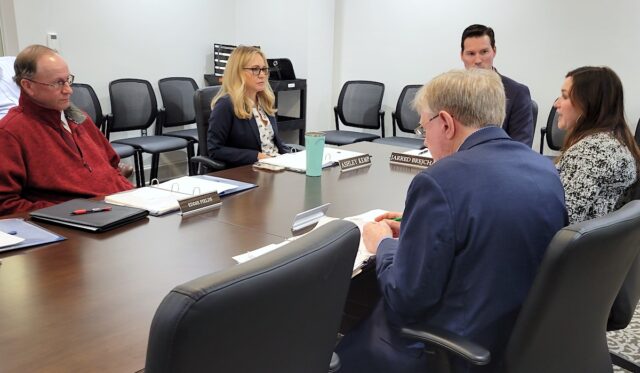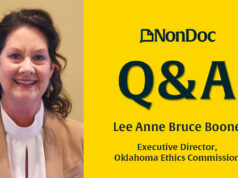
With the plug possibly being pulled on the public website for state-level campaigns and lobbyist reporting in the middle of the 2024 election cycle, the Oklahoma Ethics Commission today authorized its executive director to retain an attorney to file a claim in a contractual dispute with the system’s vendor.
Representatives from Civix, a public software and services firm, notified the Ethics Commission by email in July that the software used to operate The Guardian System would no longer be updated after July 1, 2024. The Guardian System, which went online in 2014, is a public transparency website for state-level campaigns, lobbyist reporting, and other documents filed with the Oklahoma Ethics Commission. Campaign and lobbyist filings are immediately available for public viewing once the documents are filed.
Candidate filing for 2024 statewide and legislative elections will occur in April. Some candidates already have formed committees to raise funds for their campaigns. Their reports may be viewed on The Guardian System’s website.
Ashley Kemp, outgoing executive director of the Ethics Commission, said the end of The Guardian System would be extremely disruptive on two fronts:
- All the existing campaign reports and lobbyist expense reports dating back to 2015 would be lost; and
- Candidates in the 2024 election cycle would have to go to a different type of reporting process in the middle of a campaign. That could involve another digital vendor, or it could mean candidates filing PDF reports with the Ethics Commission and those reports being placed on a website. Ethics Commission rules require all campaign reports to be filed electronically.
“I think it will be a nightmare for all committees, everybody involved in the campaign finance world,” Kemp said. “It will be a real headache.”
The Guardian System is also convenient for candidates and their committees because it automatically aggregates contributions, develops percentages and provides warnings, such as potentially identifying when a contribution is from a corporation or business, which is not allowed.
“They would be all of a sudden responsible for maintaining and keeping track of all of that on their own and developing their own system,” Kemp said.
All data entered into The Guardian System is available to perform customized searches. It also permits data to be downloaded by individuals, the media, research groups and others.
Kemp said all data entered into The Guardian System is available to perform customized searches. It also permits data to be downloaded by individuals, the media, research groups and others.
‘We do not have the funds on hand to do this’
Civix first informed the Ethics Commission earlier this year that The Guardian System, which cost about $750,000 to create in 2014, would need to be upgraded at a cost of $1.8 million, Kemp said. Since 2014, Civix bought the company that installed and upgraded The Guardian System as well as a couple of similar firms.
While the state of Oklahoma owns The Guardian System, Civix, which operates it, said changes to its own technology mean it will no longer be able to support The Guardian System after July 1, she said.
This spring, Kemp responded by informing Civix that the Ethics Commission needed a proposal from the company to help convince legislators to consider additional funds for the upgrade. No proposal was presented to the Ethics Commission before lawmakers completed work on the budget in late May, and no additional funding for an upgrade to The Guardian System was included in the budget for the current fiscal year.
In July, Civix modified its proposal and offered an option for the Ethics Commission to pay the cost over a 10-year period, Kemp said. The Ethics Commission now pays $4,800 a month for maintenance of The Guardian System.
“What they were calling an upgrade, in reality, is entirely a new system,” Kemp said.
Christy Wilson, strategic account director with Civix, told Kemp in a July 21 email that Civix planned to “sunset” the Guardian System.
“After careful consideration, Civix has made the decision to sunset the current ethics platform on July 1, 2024,” Wilson wrote. “This means that support for the platform just executed its last renewal period before it becomes unavailable for use.”
Wilson wrote that Civix was looking for “a commitment from the Ethics Commission to upgrade to the new ethics platform” and that the proposed price of $1.8 million would expire Dec. 31.
Kemp said she had explained the budgeting process to Civix, and that the Ethics Commission would not be able to get money from the Legislature for a new system until lawmakers convene Feb. 5 for the 2024 session. Commissioners last month voted to request $1.2 million in special project funds for a new system to track campaign activity and lobbyist spending in the state.
“We do not have the funds on hand to do this,” Kemp said. “Dec. 31 is just not workable. The Legislature isn’t in session. (…) So, really what we need is a different timeline to make the budget request.”
The Ethics Commission has been trying to get Civix to allow The Guardian System to remain online through February 2025, but she said the company has not responded.
The lack of response from Civix and the approaching Dec. 31 deadline to agree to pay for a new system led the Ethics Commission to seek legal advice. Commissioners voted 4-0 today to retain an attorney to file a possible claim against a vendor. Chairman Jarred Brejcha said he could not identify the company because discussions were held in executive session, but the commission’s dispute with Civix is of public knowledge.
Wilson did not respond to a telephone call from NonDoc before the publication of this article. Similarly, Gordon Crawford, who served as a representative for Civix to the Ethics Commission, did not respond to emails.
Kemp said she also could not comment on what was discussed in Friday’s closed executive session, but she said earlier that the Ethics Commission has been trying to get Civix to allow The Guardian System to remain online through February 2025 so that all reports filed during the 2024 election cycle could be recorded in that system.
“It’s a very useful tool not just for those who are reporting but also to the citizens (and) the media to have that level of information,” Kemp said.
Settlement agreement reached with rural water association PAC
Also following its executive session Friday, the Ethics Commission entered into a settlement agreement with the Oklahoma Rural Water Association Political Action Committee. The political action committee agreed to pay $12,000 to the state and $1,000 for the Ethics Commission’s attorney fees.
Kemp said the Oklahoma Rural Water Association self-reported issues with compliance with ethics rules, including:
- More than $3,200 of impermissible contributions and transfers between the affiliated entity’s account and the PAC account;
- Receiving approximately $3,570 in cash contributions without attribution to a specific contributor;
- Receiving corporate contributions through donations of in-kind items for PAC fundraisers; and
- Failing to maintain full and complete records of the committee’s operations.
As a result, the Ethics Commission and the Oklahoma Rural Water Association PAC agreed to:
- Payment of $12,000 to the state’s General Revenue Fund within 30 days;
- Payment $1,000 to the Ethics Commission for attorney fees and costs;
- Amendment of reports within 60 days;
- Dissolution of the PAC within 60 days; and
- Disposal of all PAC assets and any remaining funds with the General Revenue Fund.
The Oklahoma Rural Water Association also agreed not to form a new affiliated PAC for six months.
“This agreement is a result of the PAC voluntarily coming into compliance with the ethics rules and offering the commission a reasonable settlement agreement to consider during its meeting,” Kemp said in a statement. “The actions of the PAC in self-reporting these acts and being proactive in remedying this saved the commission significant time and resources that would otherwise have been used in an investigation and enforcement. Voluntary compliance, over enforcement, remains the goal of the commission in fulfilling the responsibilities vested in it by citizens of Oklahoma.”
Commissioners also voted 4-0 in executive session to promote Stephanie McCord, the agency’s general counsel, to general counsel and deputy director. McCord, who started with the Ethics Commission in 2014 as a legal intern and later worked as a compliance officer, will be paid an annual salary of $115,000, an increase from her current salary of $92,000. The promotion takes effect immediately.
The Ethics Commission’s January meeting is scheduled to be the first for new executive director Lee Anne Bruce Boone.





















